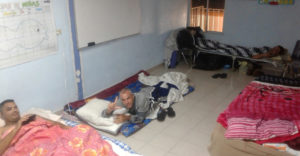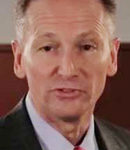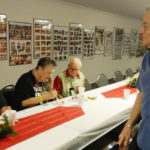En Español aqui.
LAREDO—Lorenzo Ortiz, pastor of Iglesia Bautista Emmanuel in Laredo, believes God opened his eyes to the needs of vulnerable people and led him to minister to immigrants in his South Texas border city and its sister city across the Rio Grande.
Since 2017, Ortiz has ministered to immigrants—first working with Cubans in Nuevo Laredo and more recently with undocumented Mexican immigrants who are being deported from the United States.
He works alongside his family—particularly his daughter, Ruth, and his sister, Micaela—as well as his church and other congregations in Laredo and neighboring Nuevo Laredo.
Ministering to Cubans in Nuevo Laredo

Evangelism training Texas Baptists provided in Laredo a few years ago opened his eyes to ways he could share the gospel, Ortiz said.
When President Obama ended the ‘wet foot, dry foot’ policy, which gave permanent residency to any Cubans who reached American soil, many Cubans instead sought to enter the United States through Mexico.
A dozen churches in Nuevo Laredo provided lodging to Cubans in their sanctuaries and fed their guests breakfast and lunch each day. They included four Baptist congregations, with whom Ortiz worked.
Caring for deported immigrants
Now, Ortiz is seeking to minister to undocumented Mexican immigrants who are being deported from the United States.
“Laredo is the border town from where 60 percent of immigrants are deported, and that number will increase,” Ortiz said.
“It is already difficult for us to provide shelter and food for all of the people. We are not ready to receive more people who are going to be deported.”
More than 150 newly deported immigrants enter Nuevo Laredo every day, and it can take a couple of days for them to find a way back home, Ortiz noted.
Most of the Nuevo Laredo churches that ministered to Cuban immigrants now are helping care for deported immigrants. The churches often provide assistance to more than 300 deportees each day, Ortiz said.
Ortiz finds lodging for immigrants, helps deportees obtain documents, and connects them with agencies that can help them go back to their home state.
Incarnational evangelism
But he sees his service as more than social action. He views it as incarnational evangelism—being with people in their suffering, their search for hope and their longing for justice.

“This is what evangelism should be like. It should have an impact on people’s lives,” Ortiz said. “There is a difference between impacting lives and just giving them information about the gospel.”
Just as people have left their home, family and possessions in order to search for hope, the church also must imitate Christ and walk with people in their search for hope, he said.
Texas Baptists’ River Ministry has committed to provide funding assistance and kitchen appliances so churches have better equipment to prepare the food they serve. First Baptist Church in Missouri City, near Houston, also provides financial support.
But the congregations along the border still need more help, especially if the number of deportees is going to increase, Ortiz said.
Processing facilities in Laredo area
Ortiz begins his ministry to deportees when they arrive at two Laredo-area facilities, the Laredo Processing Center and the Rio Grande Detention Center—both operated by private companies.
In a report released in mid-December, the office of the inspector general in the Department of Homeland Security pointed to serious problems discovered in four of the five facilities where they performed unannounced inspections.
Although the Laredo Processing Center received high marks from the inspector general’s office, some others were cited for inappropriate treatment of detainees and delayed medical care—including one Georgia facility operated by the Laredo center’s parent company, CoreCivic.
GEO Group, parent company of the Rio Grande Detention Center, faces class action lawsuits for alleged mistreatment of detainees at a Colorado facility and federal civil rights complaints regarding abuse at some other facilities.
In last year’s report, the office of inspector general recommended U.S. Immigration and Customs Enforcement improve its oversight of detention facility management and operations after hearing concerns from immigration rights groups and complaints from detainees.
“CoreCivic is deeply committed to providing a safe, humane and appropriate environment for those entrusted to our care, while also delivering cost-effective solutions to the challenges our government partners face,” said Jonathan Burns, the company’s director of public affairs. “We work in close coordination with our partners at ICE to ensure the well-being of the detainees at our ICE-contracted detention facilities.”
ICE detention service managers who work full-time at facilities including Laredo Processing Center “have unfettered access to the facility and detainees, and report independently to ICE headquarters,” Burns added.
Ortiz noted he has heard reports from detainees at the Rio Grande Detention Center regarding their poor treatment at the facility. GEO Group did not respond when contacted by the Baptist Standard for comment.
‘They feel cast off’

Once deportees are dropped off at the border, they cross over to Mexico and stop at the Instituto Tamaulipeco para los Migrantes , Tamaulipan Institute for Migrants. At that Mexican state agency, Ortiz seeks to make sure the deportees have clothing, food and hygiene items when they try to journey home.
“When they go across the border, they feel ruined. They feel cast off,” Ortiz observed.
Many times, going back to the state they left means returning to nothing, Ortiz said. Their families are no longer there, they no longer have a home, and they return as outsiders.
“The church has to be responsible for what happens in the community,” Ortiz said. “We are the ones who have to present solutions to the problems people have.”
If people feel they are in a dark place, the church has a responsibility to be the light of Christ, he insisted.
Needs are great, and a limited number of churches are seeking to respond with severely limited resources, Ortiz noted. The congregations trust in God to bless their efforts, he added.
“God is the one that plants the seed, and God is the one who gives it growth,” he said.
Ortiz challenged additional congregations to become involved in ministry to deported immigrants.
“All they have to do is go outside and see the need around them,” he said.
As the church grows closer God, it also cares more and more for other’s circumstances, Ortiz said. He points to the words of Jesus in Matthew 25 as his guide—ministry to the most vulnerable, people with whom Christ identifies.
“We realize God is not working in our ministries but that we are working in God’s ministry.” Ortiz said.















We seek to connect God’s story and God’s people around the world. To learn more about God’s story, click here.
Send comments and feedback to Eric Black, our editor. For comments to be published, please specify “letter to the editor.” Maximum length for publication is 300 words.